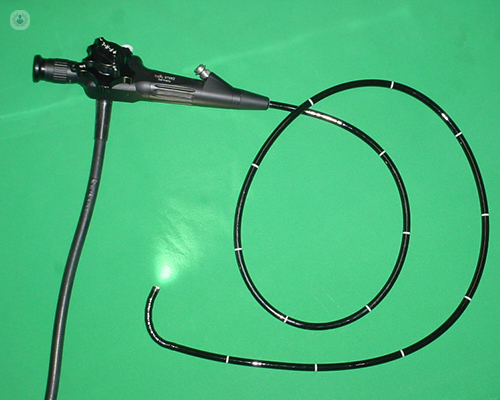What is an endoscopy and why would I need one?
Written in association with:An endoscopy is a common procedure used to help make a diagnosis. An endoscopy uses a small camera device which is inserted through a natural opening, such as the mouth, throat or anus. Dr Adam Haycock, a top gastroenterologist, discusses the ins and outs of endoscopies and what they involve.

Who needs an endoscopy?
An endoscopy is a test to look inside the gastrointestinal tract. Potentially, anybody who has symptoms of a problem inside the stomach or the live bowel or the small bowel may need an endoscopy. It is the best test to use for diagnosing a number of different symptoms. These can range from difficulty in swallowing, pain in the chest or the stomach, problems with bleeding, such as anaemia or actually vomiting or passing blood, weight loss or a change in bowel habit, such as diarrhoea. Any of these may require an investigation of either the upper GI tract, which would be an endoscopy or gastroscopy or the lower GI tract which would normally be a colonoscopy or a flexible sigmoidoscopy. As well as for diagnosing people with symptoms, endoscopy can also be used to provide treatments.
We may want to take biopsies to make a diagnosis of a particular disease or we can remove polyps or other problems within the GI tract. This is often done after the first endoscopy but may also be done in the initial procedure.
Who carries out an endoscopy?
Endoscopy can be carried out by anybody who’s been properly trained to perform these procedures. Usually, in most cases, this will be a doctor and they will be trained by a gastroenterologist or a gastroenterological surgeon. Sometimes these are done by nurses, particularly in the National Health Service.
Most people who do these procedures will have been accredited by the joint advisory group for endoscopy, which is an overarching body which accredits people to perform gastrointestinal endoscopy. Some people may also be accredited for bowel cancer screening which requires an additional test and checking of their expertise.
What does an endoscopy involve?
There will be some preparation for any endoscopy. It depends whether the endoscopy is going to be into the stomach or around the large bowel and through the bottom. There may be a requirement to stop some medicines, particularly things like anticoagulation some days beforehand. There will be a period of fasting particularly for a gastroscopy which is important because the stomach needs to be empty of fluid to allow the endoscopist to see things properly.
In addition, for small valve or colonic procedures such as a colonoscopy or a sigmoidoscopy, there is the need to take a laxative. This is to clear the bowel of any debris and stool to again make sure the endoscopist can see things properly.
Most people consider that that is actually the most difficult part of the test and the endoscopy itself may be easier than the bowel preparation.
If you are due to have an endoscopy or would like to find out more, make an appointment with a specialist.


